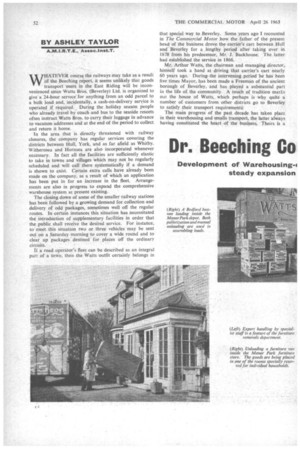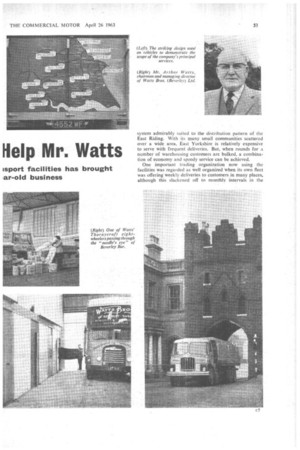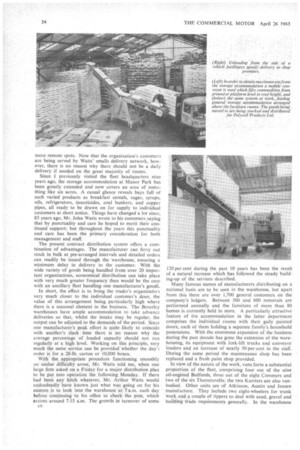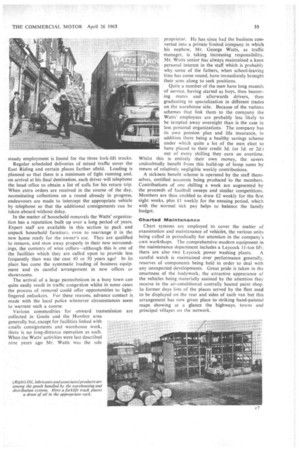Dr. Bombing Co Help Mrs Watts
Page 54

Page 55

Page 56

Page 57

If you've noticed an error in this article please click here to report it so we can fix it.
BY ASHLEY TAYLOR
A.M.I.R.T.E., Assoc.Inst.T.
WHATEVER course the railways may take as a result of the Beeching report, it seems unlikely that goods transport users in the East Riding will be inconvenienced since Watts Bros. (Beverley) Ltd. is organized to give a 24-hour servicelor anything from an odd parcel to a bulk load and, incidentally, a cash-on-delivery service is operated if required., During the holiday season people who already travel by coach and bus to the seaside resorts often instruct Watts Bros. to carry their luggage in advance to vacation addresses and at the end of the period to collect and return it home.
In the area that is directly threatened with railway closures, the company has regular services covering the districts between Hull, York, and as far afield as Whitby. Withernsea and Hornsea are also incorporated whenever necessary. In fact all the facilities are sufficiently elastic to take in towns and villages Which may not be regularly scheduled and will call there systematically if a demand is shown to exist. Certain extra calls have already been made on the company, as a result of which an application has been put in for an increase in the fleet. Arrangements are also in progress to expand the comprehensive warehouse system at present existing.
The closing down of some of the smaller railway stations has been followed by a growing demand for collection and delivery of odd packages, sometimes well off the regular routes. In certain instances this situation has necessitated the introduction of supplementary facilities in order that the public shall receive the desired service. For instance, to meet this situation two or three vehiclesmay be sent out on a Saturday morning to cover a wide round and to clear up packages destined for places off the ordinary circuits.
If a road operator's fleet can be described as an integral part of a town, then the Watts outfit certainly belongs in
that special way, to Beverley. Some years ago I recounted in The Commercial Motor how the father of the present head of the business drove the carrier's cart between Hull and Beverley for a lengthy period after taking over in D,78 from his predecessor, Mr. J. Bacichouse. The latter had established the service in 1866.
Mr. Arthur Watts, the chairman and managing director, himself took a hand at driving that carrier's cart nearly 60 years ago. During-the intervening period he has been five times Mayor, has been made a Freeman of the ancient borough of Beverley, and has played a substantial part in the life of. the community. A touch of tradition inar;ks out the house of Watts, which perhaps is why quite a number of customers from other districts go to Beverley to satisfy their transport requirements.
The main progress of the past decade has taken place in their warehousing and smalls transport, the latter always having constituted the heart dl the business. Theirs is a
system admirably suited to the distribution pattern of the East Riding. With its many small communities scattered over a wide area, East Yorkshire is relatively expensive to serve with frequent deliveries. But, when rounds for a number of warehousing customers are bulked, a combination of economy and speedy service can be achieved.
One important trading organization now using the facilities was regarded as well organized When its own fleet was offering weekly deliveries to customers in many places, although this slackened off to monthly intervals in the more remote spots. Now that the organization's customers are being served by Watts' smalls delivery network, however, there is no reason why there should not be a daily delivery if needed on the great majority of routes.
Since I previously visited the fleet headquarters nine years ago, the storage accommodation at Manor Park has been greatly extended and now covers an area of something like six acres. A casual glance reveals bays full of such varied -products as breakfast cereals, sugar, syrups, oils, refrigerators, insecticides, coal bunkers, and copper Pipes, all ready to be drawn on for supply to individual customers at short notice. Things have changed a lot since, 85 years ago, Mr. John Watts wrote to his customers saying that by punctuality and care he hoped to merit their continued support; but throughout the years this punctuality and care has been the primary consideration for both management and staff.
The present contract distribution system offers a combination of advantages. The manufacturer can ferry out stock in bulk at pre-arranged intervals and detailed orders can readily be issued through the warehouse, ensuring a minimum delay in delivery to the customer. With the wide variety of goods being handled from over 20 important organizations, economical distribution can take place with very much greater frequency than would be the case with an ancillary fleet handling one manufacturer's good.
In short, the effect is to bring the trader's organizatiol very much closer to the individual customer's door, the value of this arrangement being particularly high where there is a seasonal element in the business. The Beverley warehouses have ample accommodation to take advance deliveries so that, whilst the intake may be • regular, the output can be adjusted.to the demands of the period. Since one manufacturer's peak effort is quite likely to coincide with another's slack time there is no reason why the average percentage of loaded capacity should not run regularly at a high level. Working on this principle, very much the same servicecan be provided .whether the day'3 order is for a 28-lb. carton or •10,000 boxes.
With the appropriate procedure functioning smoothly no undue difficulty arose, Mr. Watts told me, when one large firm asked on a Friday for a major distribution plan to be put into operation the following Monday. If there had been any hitch whatever, Mr. Arthur Watts • wottld undoubtedly have known just what was going on for his. custom is to look into the warehouse at 7 a.m. each day before continuingto his office to check the post, which arrives around 7.15 a.m. The growth in turnover of some e6 120 per cent during the past 10 years has been the result of a natural increase which has followed the steady building-up of the services described.
Many famous names of manufacturers distributing on a national basis are to be seen in the warehouse, but Apart from this there are over 1,700 general customers on the company's ledgers. Between 500 and 600 removals are performed annually and the furniture of more than 80 homes is currently held in store. A particularly attractive feature of the accommodation in the latter department comprises the individual rooms with their gaily painted doors, each of them holding a separate family's household possessions. With the enormous expansion of the business during the past decade has gone the extension of the warehousing, its equipment with fork-lift trucks and conveyor loaders and an increase of nearly 50 per cent in the staff. During the same period the maintenance shop has been replaced and a fresh paint shop provided.
In view of the nature of the work, vans form a substantial proportion of the fleet, comprising four out of the nine oil-engined Bedfords, three out of the eight Commers and two of the six Thornycrofts; the two Karriers are also vanbodied. Other units are of Atkinson, Austin and Jensen manufacture. They include two eight-wheelers for trunk work and a couple of tippers to deal with sand, gravel and building' trade requirements generally. In the warehouse steady employment is found for the three fork-lift trucks.
Regular scheduled deliveries of mixed traffic cover the East Riding and certain places farther afield. Loading is planned so that there is a minimum of light running and, on arrival at his final destination, each driver will telephone the head office to obtain a list of calls for his return trip. When extra orders are received in the course of the day, necessitating collections on a round already in progress, endeavours are made to intercept the appropriate vehicle by telephone so that the additional consignments can be taken aboard without delay.
In the matter of household removals the Watts' organization has a reputation built up over a long period of years. Expert staff are available in this section to pack and unpack household furniture, even to rearrange it in the new home ready for the owner's use. They are qualified to remove, and stow away properly in their new surroundings, the contents of wine cellars—although this is one of the facilities which they are called upon to provide less frequently than was the case 40 or 50 years ago! In its place has come the systematic loading of business equipment and its careful arrangement in new offices or showrooms.
The arrival of a large pantechnicon in a busy town can quite easily result in traffic congestion whilst in some cases the process of removal could offer opportunities to lightfingered onlookers. For these reasons, advance contact is made with the local police whenever circumstances seem to warrant such a course.
Various commodities for onward transmission are collected in Goole and the Humber area generally but, except for facilities linked with smalls consignments and warehouse work, there is no long-distance operation as such. When the Watts' activities were last described nine years ago Mr. Watts was the sole
proprietor. He has since had the business converted into a private limited company in which his nephew, Mr. George Watts, as traffic manager, is taking increasing responsibility. Mr. Watts senior has -always maintained a keen personal interest in the staff which. is probably why some of the fathers, when school-leaving time has come round, have immediately brought their sons along to seek positions.
Quite a number of the men have long records of service, having started as boys, then becoming mates and afterwards drivers, then graduating to specialization in different trades on the warehouse side. Because of the various schemes that link them to the company the Watts' employees are probably less. likely to be tempted away overnight than is the case in less personal organizations. The company has its own pension plan and life insurance, in addition there being a healthy savings scheme under which quite a lot of the men elect to have placed to their credit 3d. (or Id. or 2d.) out of every shilling they earn on overtime. Whilst this is entirely their own money, the savers undoubtedly benefit from this build-up of lump sums by means of relatively negligible weekly contributions.
A sickness benefit scheme is operated by the staff themselves, certified accounts being produced to the members. Contributions of one shilling a week are augmented by the proceeds of football sweeps and similar competitions. Members are thus enabled to draw £2 weekly for the first eight weeks, plus 1 weekly for the ensuing period, which with the normal sick pay helps to balance the family budget.
Charted Maintenance Chart systems are employed to cover the matter of examination and maintenance of vehicles, the various units being called in periodically for attention in the company's own workshops. The comprehensive modern equipment in the maintenance department includes a Laycock 11-ton lift; there are also two Laycock power washing plants. A careful watch is maintained over performance generally, reserves of components being held in order to deal with any unexpected developments. Great pride is taken in the smartness of the bodywork, the attractive appearance of the vehicles being materially assisted by the attention they receive in the air-conditioned centrally heated paint shop. In former days lists of the places served by the fleet used to be displayed on the rear and sides of each van but this arrangement has now given place to striking hand-painted maps showing at a glance the highways, towns and principal villages on the network.












































































































